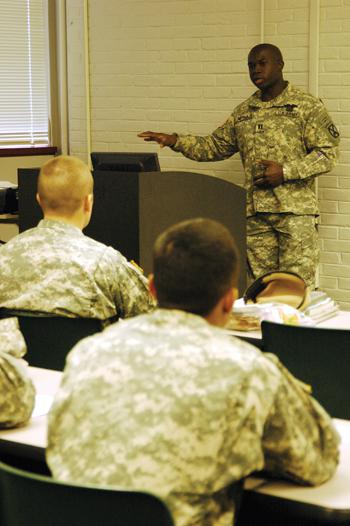A palpable sense of respect hung in the air as a room of University ROTC cadets sat silently waiting to hear a wounded veteran of the war in Iraq share his experiences overseas. Capt. William Reynolds III addressed the group of cadets Tuesday in the Military Science Building.
“What Hollywood judges as a hero is wrong in my opinion. This man is a true American hero,” said Capt. Daniel Hostra, University ROTC instructor.
Reynolds received several medals including the Bronze Star and the Purple Heart, Hostra said.
Reynolds was deployed to Iraq with the 10th Mountain Division in April 2004 and received only two months of notice.
His unit was sent first to Kuwait, where they spent 30 days becoming acclimated to the environment.
Reynolds said his unit then traveled to Baghdad to replace the First Cavalry Division. He said he spent another 30 days working with the First Cavalry Division in what he called “right-seat rides,” a practice in which units currently in an area train new units that will take over their positions.
“The insurgents really escalated their attacks during the changeover. We’re in their backyard, and they know when a new unit is coming in,” Reynolds said. “There was some heavy combat, and we took a lot of casualties in the first two weeks before we got the area under control.”
Reynolds was assigned to lead a reconnaissance team to gather intelligence on important targets, and he employed snipers throughout the area.
He said an important part of his platoon’s strategy was to patrol the streets regularly with “boots on the ground,” and interact with the local population as much as possible. But locals were reluctant to give information to the U.S. forces.
“They plead the [Fifth Amendment] all the time and are very ambiguous. As soon as we leave, the insurgents will come in right behind us and interrogate them,” he said.
The room was silent as Reynolds recounted the events of the day he received his injury.
Another U.S. platoon was guarding a highway overpass to Reynolds’ flank.
“It looked just like any overpass you might see in any city in America,” Reynolds said.
A vehicle carrying an improvised explosive device was driven off the overpass and directly into the center of the nearby platoon.
“You can imagine the destruction it caused in such a small area,” he said.
Reynolds said his unit moved immediately, leaving their area to assist the distressed platoon.
“Fortunately, everyone in my platoon had combat lifesaver training, and we were able to save a lot of lives,” Reynolds said.
In hindsight, Reynolds said, he should have waited for another platoon to relieve them before leaving his patrol area.
Upon returning to his platoon’s patrol zone, the gunner in Reynolds’ vehicle noticed a suspicious object beside the road. Reynolds’ team used long-range bomb detecting equipment including sighting devices and a “bomb-sniffer,” which detects traces of chemicals in the air, but both methods failed to detect a threat.
“As many leaders often do, I tried to give my men some relief by moving to inspect the object myself,” Reynolds said.
He was accompanied by a National Guard platoon leader who was new to the area and was going to show him the proper method for inspecting a suspected IED.
Reynolds said before nearing the device, an explosion tore through the area.
“These insurgents are very crafty,” he said.
He said the suspicious device was set up as a decoy to draw the soldiers to walk across the area where the real explosives were concealed.
Reynolds suffered severe injuries and severed several main arteries in his arm and legs. The officer accompanying him lost his leg completely. Reynolds received aid immediately from his gunner, who was also wounded by the blast and was then rushed to the local surgical facility.
Reynolds has since undergone 22 major surgeries, Hostra said. Reynolds continues to serve in the Army despite his injuries and works with the Joint Improvised Explosive Device Defeat task force.
The JIEDD works with engineering firms to “find new ways to mitigate IEDs, which are the No.1 killer of our troops,” Reynolds said.
—–Contact Jimmy Garrett at jgarrett@lsureveille.com
Veteran shares experience with students
March 14, 2007

Captain William Reynolds III tells his story to senior cadets Tuesday morning. Reynolds was injured by a IED in Iraq while serving in the military.



